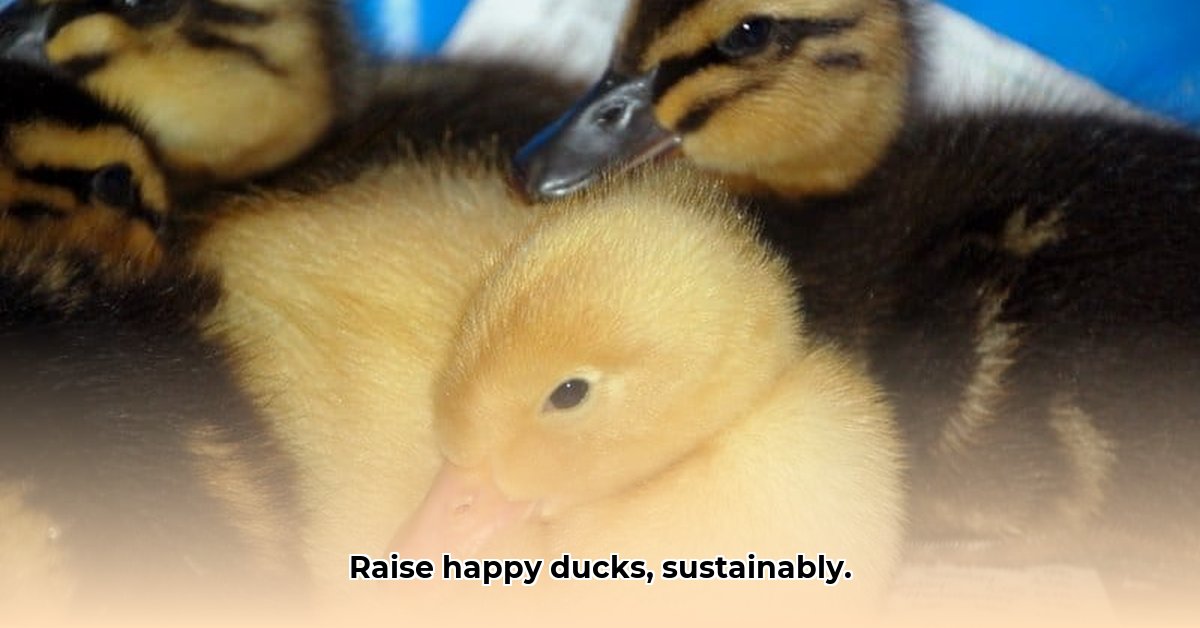
Thinking about raising ducks? This guide will walk you through everything you need to know to start your own sustainable duck farm, using Tractor Supply as a convenient starting point for supplies and ducklings. Whether you're a seasoned farmer or a complete beginner, we'll cover breed selection, setup, sustainable practices, and potential challenges. Let's get started! For more information on housing options, check out these helpful resources.
Finding Your Flock at Tractor Supply
Tractor Supply often stocks popular duck breeds like Pekins, Rouens, Mallards, and Muscovies, offering a convenient source for ducklings. However, breed availability varies seasonally and by location. Always check your local store's website or call ahead to confirm availability. Prices typically range from $10 to $15 per duckling, but rare breeds may cost more.
Before buying, consider your goals. Do you want meat, eggs, or both? Pekins are known for their meat and egg production, while Rouens are prized for their beauty. Understanding your goals will help you choose the right breed. What are your goals for your duck farm?
Setting Up Your Duck Haven: A Step-by-Step Plan
Raising healthy ducks begins with preparation. Follow these steps to create a thriving duck habitat:
Research Your Breed: Before purchasing, research the breed's specific needs (housing requirements, temperament, disease susceptibility). This ensures you provide optimal care.
Prepare Housing: Build a secure, well-ventilated coop or pen, protected from the elements and predators. This includes appropriate feeders and waterers.
Choose Your Ducklings: At Tractor Supply, inspect each duckling for bright eyes, clean feathers, and alertness. Avoid lethargic or sick ducklings. Are you focusing on specific qualities, such as egg laying or meat production?
Gentle Introduction: Gradually introduce ducklings to their new home to minimize stress.
Daily Care: Provide fresh water daily (ducks drink a lot!), high-quality duck feed, and maintain a clean living space. How often do you plan on cleaning the duck area?
Continuous Monitoring: Regularly check for signs of illness or stress. Consult an avian veterinarian if needed. What is your plan for addressing potential disease outbreaks?
Sustainable Duck Farming: Integrating Ducks into Your System
Ducks are natural pest controllers, eating slugs, snails, and other garden pests. Their droppings are excellent fertilizer, reducing your reliance on chemical fertilizers. This natural approach enhances sustainability and reduces costs. However, responsible management is crucial. Rotate pastures to prevent overgrazing and ensure ample space for your ducks to thrive. How will you integrate your ducks into a diverse farming system?
Duck Breed Comparison: A Quick Overview
Choosing the right duck breed impacts your farm's success. Here's a comparison:
| Breed | Pros | Cons |
|---|---|---|
| Pekin | Fast-growing, excellent egg & meat production | Noisy, prone to some diseases |
| Rouen | Beautiful plumage, excellent meat producer | Slower to mature, more temperamental |
| Mallard | Hardy, adaptable, good layers | Lower meat production |
| Muscovy | Quiet, disease-resistant, good meat producer | Lower egg production, less friendly |
Remember, individual birds may vary.
Potential Challenges and Solutions
Even with careful planning, challenges may arise. Here are some common issues and how to address them:
Disease Prevention: Maintain biosecurity by cleaning your duck area and consulting an avian veterinarian for vaccination advice.
Predator Protection: Secure your housing to protect against predators (foxes, raccoons). Use deterrents if needed.
Market Research: Research local markets and pricing before selling ducks or eggs. Consider value-added products.
Seasonal Availability: Plan your purchase in advance as ducklings aren't available year-round.
How to Start Your Sustainable Duck Farm: Key Steps
Dr. Emily Carter, Avian Veterinarian at Ohio State University, emphasizes, "Starting small and focusing on sustainable practices is key to long-term success in duck farming."
Here's a concise guide to launching your sustainable duck farm:
Breed Selection: Research and choose breeds suitable for your goals (eggs, meat, both) and your resources.
Sourcing Supplies: Tractor Supply is a good start, but you may need to supplement with other suppliers for specialty items and organic feed.
Habitat Creation: Build a predator-proof, well-ventilated coop with space for foraging.
Sustainable Feeding: Prioritize organic, locally sourced feed whenever possible.
Future Planning: Design a plan for scaling your operation sustainably, diversifying your income, and exploring value-added products.
Regulations and Funding: Research and comply with regulations and secure funding through loans, grants, or other avenues.
Raising ducks can be highly rewarding. With careful planning and a commitment to sustainability, starting with Tractor Supply can be the first step toward a successful and fulfilling duck farming journey. Remember that ongoing learning and adaptation are vital for success in any farming enterprise.